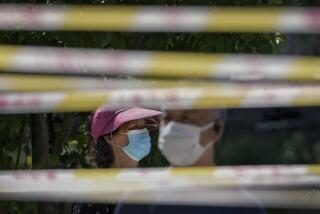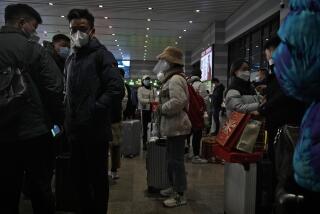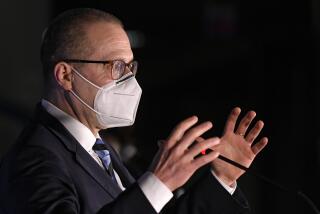Suspected New SARS Case in China Sparks Fresh Concerns
- Share via
BEIJING — China announced its first new suspected case of SARS in months Saturday, raising concerns of another outbreak in advance of lunar New Year’s Day, the country’s biggest holiday and a time of extensive regional travel.
In marked contrast to its handling of severe acute respiratory syndrome cases last winter and spring, however, when China initially balked at recognizing the problem, Beijing was relatively quick to alert the World Health Organization and the general public this time.
Hong Kong, which released the news a few hours before Beijing, stepped up checks on travelers, opened a hotline and instituted a precautionary alert. Italy announced health checks on direct flights from China, with other governments expected to follow suit. And China said it was increasing monitoring at airports and train stations.
According to the state-run New China News Agency, the suspected case involves a 32-year-old freelance TV worker in Guangzhou, the capital of Guangdong province. Hong Kong health director Lam Ping-yan said at a news conference that the patient was undergoing further tests and that those in close contact with him had been isolated.
The patient, whose name was not released, reportedly came down with a fever and headache Dec. 16, checked himself into a local hospital Dec. 20, was quarantined Wednesday -- initially with a diagnosis of pneumonia -- and was declared a suspected SARS case two days later. WHO officials said they were notified the same day.
The patient said he had not left Guangdong nor eaten any wild animals during the prior month, the news agency said, quoting Wang Zhiqiong, deputy head of the Guangdong health department. Civet, a wild cat eaten in southern China, is believed to be a carrier of the virus.
This is the first suspected SARS case in China since July, when WHO lifted its worldwide warning for the disease.
Experts had predicted SARS would reemerge once cold weather returned to China. SARS first appeared in Guangdong, in southern China near Hong Kong, in November 2002.
Travelers quickly spread the disease, which went on to infect nearly 8,100 people in more than two dozen countries, killing 774, according to the WHO. Nearly half of the fatalities occurred on the Chinese mainland.
Unlike two recent cases in Singapore and Taiwan, the new case in China does not involve a scientist handling the SARS virus.
If the case is confirmed, the occurrence of a new infection within China will probably raise concerns among health professionals and the general public -- particularly with the lunar New Year approaching in January, relatively early.
In Beijing, residents seemed to take the news in stride, however, as several expressed confidence that their government would react quickly and contain the damage.
“I’m not afraid for my own health,” said Li Shuzhen, a 66-year-old retiree. “Guangzhou is far away from Beijing, and I believe the government will control it and deal with it properly.”
SARS in China had a huge economic and public-image effect on the giant developing country. Tourism and domestic travel dropped to a crawl this year, while trade activity foundered as overseas partners canceled orders and refused to attend business meetings.
“I don’t think this will be as important an event as some people may fear,” Wang Yong, director of the Center for Political Economy at Beijing University, said of the new suspected SARS case. “China has experienced this issue before and is much better prepared.”
Indeed, Beijing appeared to learn important lessons from its initial mishandling of the earlier outbreak that, some political scientists believe, could resonate beyond the health field.
Early in 2003, government and Communist Party officials seemed to pretend the disease didn’t exist.
This was in keeping with a long tradition in China of suppressing bad news, especially if it occurs near a major celebratory event. In the case of the original SARS outbreak, it was surging just as China was heralding a top leadership change.
As news leaked out in an increasingly open China last spring, however, the new government of President Hu Jintao eventually sacked Beijing’s mayor and the Chinese health minister, imposed quarantines, created new reporting channels and altered the medical system.
Ultimately, the event gave a boost to the new leadership, which was credited with acting decisively and showing more concern for ordinary Chinese than the former government.
Researcher Yin Lijin in The Times’ Beijing Bureau contributed to this report.
More to Read
Sign up for Essential California
The most important California stories and recommendations in your inbox every morning.
You may occasionally receive promotional content from the Los Angeles Times.













